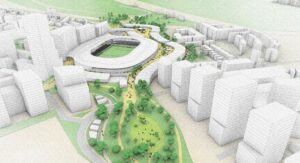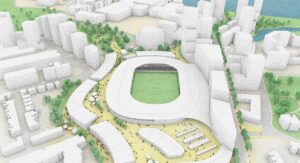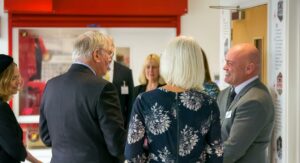With the redevelopment of the Stonebridge Road stand delayed by conditions attached to the planning consent, in particular the archaeological conditions, BBC Radio Kent’s Charles Webster this week spoke to Ebbsfleet United vice chairman Peter Varney about his frustrations, as well as representatives from Gravesham Borough Council and Kent County Council’s archaeology team.
The transcript below is reproduced by kind permission of BBC Radio Kent.
Click on the dropdown menus below to read each interview…
[toggle title=”Peter Varney, vice chairman, EUFC”]
“Our supporters would have expected work to have started by now – we got planning consent on 8th April and here we are today with no activity. Perhaps what a lot of people don’t recognise is that getting consent is just one part of the process.
“At the time we were granted consent there were 47 conditions… which we religiously worked through and we applied two weeks ago for 15 of those conditions to be discharged.
“The ones that are causing us the most issues are those relating to the archaeology associated with the site and we’ve already had six boreholes that have been drilled on this site. We provided a wealth of information to the archaeology team at Kent County Council and that is being assessed but could now take up to another eight-week period. So frustrated, yes, we want to get on and we want to build the stand. Of course we’re getting closer to the start of the season and that in itself brings with it huge problems.
“We knew [the archaeological process] was one of the issues that would be raised but to the extent that it has affected the development, I think we didn’t have any expectation that would happen. I think most people accept that Northfleet is in great need of regeneration and we saw this as a project people would welcome because, yes, it was a development of the football club but I would argue it’s probably one of the most major pieces of regeneration in Northfleet for many, many years and would transform the area. So we thought there would be a will on all sides for this to move quickly. And really there isn’t much we can do about it.
“I ought to stress that our piling goes down to six metres but eight metres down we found some Mesolithic tools and obviously they’re of interest to people that have an interest in these sorts of matters – but they’re eight metres down, they’re in situ. Our contention is that we want to get on with a project that’s about the future and is going to be something that people in Northfleet and beyond can be proud of – and not get too bogged down with the past. If something were to be found by these continual digs and boreholes, the risk is that we will have appointed a contractor and then however small that risk is, we might have to bring the contract to a grinding halt. That has huge financial implications and we can’t do that.”
[/toggle]
[toggle title=”Peter Price, Principal Planner, Gravesham Borough Council”]
“Archaeological research is common on very major developments. We were advised by Kent County Council as the specialist archaeologists that work needed to be undertaken before they could actually carry out the rebuilding of the stand. Only last week we received an application [from the football club] for the discharge of the archaeological conditions. Since we received that we contacted the archaeologists at KCC again and asked them to give us their views on the material that’s now been submitted to discharge those planning conditions. I don’t think [the project will be delayed indefinitely]. It’s just making sure they have investigated and satisfied the terms and conditions.”[/toggle]
[toggle title=”Liz Dyson, County Archaeologist, Kent County Council”]
“The borehole log shows very close below the surface the alluvial deposits – the peats and the clays – and it’s within these kinds of waterlogged sediments that we know very important archaeological remains can be found. [There was] an Anglo-Saxon mill found during construction of the North Kent link line as part of High Speed 1, [with] amazingly preserved wooden pen troughs or chutes for the water mill and all sorts of wooden features and organic remains. So that’s why we think these kinds of alluvial deposits are very important and need to be looked at carefully. If the development does affect them then they need to be investigated and recorded.
“It’s a bit hard at this stage to say [what we expect to find]. We need to let the investigations take place because the work that we’ve seen previously is at the upper end of the valley. As we move towards this end, we find that the tidal limit of the [River] Ebbsfleet has changed as you come forward in time so in the post-medieval period, the tidal limit was at Stonebridge Road at what’s now the roundabout. There’s documentary evidence of a mill somewhere in that area. I think it’s quite unlikely that it will be found on this site but we might find remains associated with it or other activities which were taking place in the area.
“Everything connected with the planning process has to be reasonable so it would be unreasonable to delay too much and we’re going to work as hard as we can with the football stadium to try and get everything done in time. I think it’s unlikely that there’ll be any major excavations here because the impact of the foundations is quite minimal and that’s been deliberately designed. So I don’t think there will be any amazing discoveries or big open areas to be looked at – but there still is important evidence to be retrieved from investigations here.”
[/toggle]
To hear the original audio interviews, visit the link below. The first interview (there are four links in all) is roughly 1hr 35 mins into the programme:



